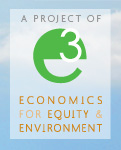The U.N. Climate Change Conference (COP17) is taking place in Durban, South Africa. The Spotlight Durban series, a joint series by Real Climate Economics and Triple Crisis , invites experts to comment on the negotiations and the prospects for real progress addressing climate change in the months and years ahead.
What are the ethical responsibilities of sovereign nations? How can we expect nations to behave, in regards to climate change? We often hear that nations will inevitably try to shape policy in ways that serve their own interests, where “interests” are largely defined in terms of short-run economic growth. Yet, if every nation sets this as a goal, we are—to use a particularly apt colloquialism—cooked.
I’m afraid that economists are particularly to blame for this perverse framing of the issue. In the economics mainstream, people are thought of as autonomous individuals who are driven by a desire to maximize their own levels of personal satisfaction. Sociality, care, ethical responsibilities, and environmental impacts are not part of the story. The insistent teaching of this approach over the last century or so has led many people to believe that selfish and even opportunistic behavior is simply “natural” or “standard” in commercial life—and therefore both excusable and unavoidable. A number of scholars of economics, law, and politics have extended this approach to thinking about governments, considering states as simply “economic man” writ large. (more…)

